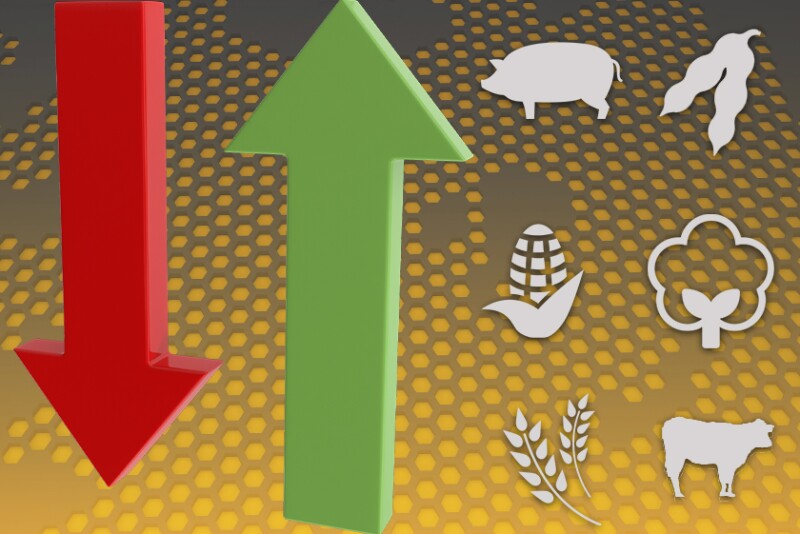GRAIN CALLS
Corn: 3 to 5 cents lower.
Soybeans: 4 to 6 cents lower.
Wheat: SRW wheat 2 to 3 cents lower, HRW and spring wheat 5 to 14 cents higher.
GENERAL COMMENTS: Corn, soybean and SRW wheat futures fell overnight as the U.S. dollar strengthened and rising Covid cases in China stoked concerns over demand. Malaysian palm oil futures fell 4.1% on a stronger ringgit and weakness in competing vegetable oils, while front-month crude oil was down nearly $1. U.S. stock index futures signal a weaker open, while the U.S. dollar index is up more than 600 points this morning.
The Kremlin said work to renew the Black Sea grain export deal is ongoing and talks with the United Nations last week were “fairly constructive.” “We are actually still a week away from the extension date (Nov. 19), so work is ongoing,” the Kremlin said. Russia has repeatedly complained its shipments of grain and fertilizers, though not directly targeted by Western sanctions, are constrained because the sanctions make it harder for exporters to process payments or to obtain vessels, insurance and access to ports.
President Joe Biden met this morning with Chinese leader Xi Jinping ahead of the G20 summit — their first in-person encounter since Biden took office. Xi told Biden the current state of China/U.S. relations was not in the interests of both countries and they needed to “steer the rudder,” according to China state broadcaster CCTV.
Federal Reserve governor Christopher Waller said the U.S. central bank needs to keep raising interest rates, even after last week’s report showed inflation slowed in October. “The market seems to have gotten way out in front on this,” Waller said. “Everybody should just take a deep breath — calm down. We have a ways to go yet.”
U.S. meatpacker Tyson Foods Inc. today forecast full-year sales above Wall Street estimates, signaling steady demand for its higher-priced chicken and beef despite decades-high levels of inflation. Packaged food makers have so far witnessed very little pushback from consumers on price increases, which were undertaken due to rising costs. Tyson projected full-year 2023 sales between $55 billion and $57 billion, compared with analysts’ expectation of $53.60 billion, according to IBES data from Refinitiv. Demand for premium cuts of beef declined in the fourth quarter compared to a year earlier, Tyson said.
China will increase pork imports in the coming months, industry participants said, after losses for farmers last year caused a reduction in hog numbers that appears larger than official data suggests. A manager at a feed producer that supplies more than 100 mid-sized pig producers across China told Reuters, “I think there’s 25% to 30% less fatteners [hogs] than a year ago.” Pan Chenjun, senior analyst at Rabobank, said: “I expect more [pork] shipments to arrive in Q4,” adding that 2023 imports will be higher than this year.
French farmers have nearly completed sowing soft wheat and winter barley for next year’s harvest and finished off harvesting this year’s grain maize crop, based on data from farm office FranceAgriMer. By Nov. 7, farmers had planted 92% of the expected soft wheat area while 97% of the anticipated winter barley had been sown, FranceAgriMer said. Emergence of soft wheat and winter barley crops was running about a week ahead of the usual pace, reflecting the effect of an exceptionally warm October.
Saudi Arabia purchased 1.009 MMT of optional origin milling wheat.
CORN: December corn overnight fell as low as $6.52 1/4, the contract’s lowest intraday price since $6.47 1/4 on Aug. 26. The contract fell 23 cents last week, the contract’s third lower weekly close in four.
SOYBEANS: January soybeans fell as low as $14.35 1/4 overnight after ending Friday at $14.50, down 12 1/4 cents for the week.
WHEAT: December SRW wheat traded within the previous session’s range overnight after ending last week at $8.13 3/4, down 34 cents for the week. HRW and spring wheat were supported by tight stocks of high protein wheat.
LIVESTOCK CALLS
CATTLE: Steady-mixed
HOGS: Steady-weaker
CATTLE: Live cattle may gain support from expectations cash prices will resume a firmer tone this week following a disappointing performance last week. Packers pulled heavily from previously contracted supplies and cattle bought with time the past two weeks, so their need for cattle in the negotiated market should be stronger this week. Live steers averaged $151.86 through Thursday morning, down 12 cents from the previous week’s average. December live cattle fell $1.55 Friday to $151.525, down 12.5 cents for the week.
HOGS: Lean hog futures may face pressure from continued erosion in cash fundamentals. The CME lean hog index is down another 33 cents to a nine-month low of $88.63 (as of Nov. 10). December hog futures finished Friday $4.28 below that level, signaling traders expect the cash index to continue to slide over the next month ahead of the contract’s cash settlement. Still, December futures ended Friday at $84.35, up $1.375 on the week.

